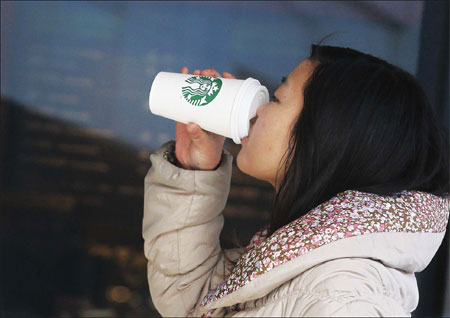No coffee mourning over expensive drinks in Starbucks
Updated: 2012-02-09 08:09
By Gao Changxin and Wang Jingshu (China Daily)
|
||||||||
|
One Starbucks patron describes herself as a "heavy coffee user" although she drinks just one 16-ounce cup a day. The price doesn't really matter to her or most Chinese customers. [Zou Hong / China Daily] |
'Not just coffee'
"The Starbucks brand continues to resonate with the Chinese consumer," John Culver, president of Starbucks China and Asia Pacific, said in an article on Starbucks' website. The Chinese market has become so important that he rates it as "our second home market outside of the United States".
Zou Deqiang, a professor studying consumer behavior at Fudan University, believes Chinese consumers are willing to pay "unreasonable" prices for a nontraditional beverage because they are buying more than just coffee.
"In China, Starbucks is not just coffee anymore," he said. "It represents a Western lifestyle. Some people in China want to live like people live in the developed countries so, to some extent, drinking a cup of coffee that people in the US drink helps them fulfill that dream."
A lot of people can't really tell good coffee from bad, Zou said, but that doesn't keep them out of Starbucks. If they hold paper cups with the Starbucks logo, it gives them the illusion that they live better than those who don't drink Starbucks.
The foreign allure
Zou's comment sheds some light on some Chinese consumers' obsession for foreign brands, most notably Apple's iPhone and iPad.
The craze was illustrated by the failed introduction of the Apple iPhone 4S in Beijing in January. Apple didn't open its flagship store and a frustrated crowd, which had waited all night, threw eggs at the store's gleaming glass walls. Many in the crowd were migrant workers hired by scalpers, who wanted to take advantage of demand that far exceeds supply. Apple shifted sales online to prevent scalping.
A student in Henan province went to the extreme. Local media reported in June that he sold his kidney for about 20,000 yuan and used the money to buy an iPad and an iPhone.
The starting price of an Apple iPhone 4S is 4,988 yuan ($790) in China and $649 in the US, where average personal income is about eight times higher. The price hasn't deterred Chinese consumers, even though they have easy access to domestic smartphones that cost about half but have similar functions and looks.
Why does 16-year-old Huang Junyi like iPhone in particular? "Because it's cool.
"Everybody wants an iPhone in our class. There is no reason for it," the Shanghai student said. "It will be big news if anybody in class gets an iPhone 4S, and you will be mocked if you use some copycat domestic smartphone."
'Badge of wealth'
Wang Haizhong, a professor studying brand strategy at Sun Yat-Sen University in Guangzhou, said the iPhone does have some advantages over other mobile phones but the advantages are not what Chinese consumers really want.
"It's mostly about vanity. Products like iPhone are seen as a badge of wealth and sophistication by young consumers in China. In fact, it's not just iPhone. Many Chinese consumers have a blind preference for brands in the US and other developed countries," he said.
Chinese consumers, he said, are highly brand-sensitive but price-insensitive, the opposite of consumers in developed countries. That explains why US consumers like cheap but high-quality Chinese products and Chinese consumers love US products.
Fudan University's Zou went deeper, saying that while consumers worldwide all tend to spend on vanity, the will is stronger in China, where "power distance" is longer.
Chinese people have a strong respect for power historically, he said, and it's hard for people to get power in society even if they are rich. So a lot of people turn to consuming to feel important and feel the dignity that is hard to obtain in daily life.
"For some consumers, no matter how their lives really are, they feel they are having a good time the moment they hold up a Starbucks coffee or show the latest version of iPhone to their friends," Zou said.
"In other words, they hope to go up a step in the social spectrum by consuming."

 Relief reaches isolated village
Relief reaches isolated village
 Rainfall poses new threats to quake-hit region
Rainfall poses new threats to quake-hit region
 Funerals begin for Boston bombing victims
Funerals begin for Boston bombing victims
 Quake takeaway from China's Air Force
Quake takeaway from China's Air Force
 Obama celebrates young inventors at science fair
Obama celebrates young inventors at science fair
 Earth Day marked around the world
Earth Day marked around the world
 Volunteer team helping students find sense of normalcy
Volunteer team helping students find sense of normalcy
 Ethnic groups quick to join rescue efforts
Ethnic groups quick to join rescue efforts
Most Viewed
Editor's Picks

|

|

|

|

|

|
Today's Top News
Health new priority for quake zone
Xi meets US top military officer
Japan's boats driven out of Diaoyu
China mulls online shopping legislation
Bird flu death toll rises to 22
Putin appoints new ambassador to China
Japanese ships blocked from Diaoyu Islands
Inspired by Guan, more Chinese pick up golf
US Weekly

|

|







